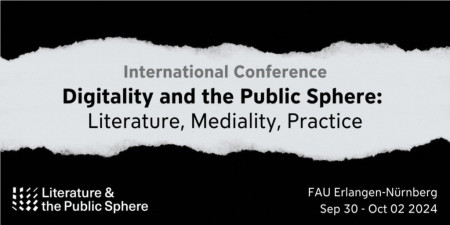Digitality and the Public Sphere: Literature, Mediality, Practice

Date: 30.09.2024 - 02.10.2024
Conference / symposium
Keywords: digital humanities, postcolonial literary theory, literature and sociology, literature and cultural studies, literature and philosophy, literature and publishing/book trade, literature and media studies, poetics
Format: onsite
Location: Erlangen, Germany
Event Fee: Free
Organizer(s):
DFG-research training group “Literature and the Public Sphere in Differentiated Contemporary Cultures” at FAU Erlangen-Nürnberg
At this moment of our present time, processes of digitalization are leading to a profound transformation of social environments. Digitalization impacts the economic, cultural, and historic conditions of the lives we live and the ways we socially interact, communicate, and self-reflect. The turn towards the digital informs cultural structures and practices, it shapes forms of knowledge production and dissemination, and it alters the very fabric of the public sphere. An increasing pluralization and differentiation of public spaces of communication raises renewed questions over the loss of an imagined consensus as well as new potentialities for processes of cultural production, their changing social, political, and cultural functions, and their ethical implications. Literature, in its extended sense of textuality, cultural production, and history of material practices, is deeply entangled in the structural shift towards digitality. As circumstances of production and reception change, a general reinterpretation of literature as such, its role and functionality, its possibilities or potential “death” ensues. At the same time, literature itself engages in reflections on the opportunities, challenges, and potential risks of the profound shift towards digitality, as digital media forge new literary forms, conventions, and aesthetic practices. Engaging with social change on the level of content, form, and models of engagement, literature actively positions itself and intervenes in the collective imagination and the shaping of processes of exchange between public spheres and new, digital frontiers. The Research Training Group “Literature and the Public Sphere in Contemporary Differentiated Cultures,” funded by the German Research Foundation, investigates the interconnections between various literatures and various publics in multilayered and heterogenous subnational and cross-national social environments since the mid-20th century. The international conference aims at investigating the diverse interrelations of literature, the public, and the digital through concrete case studies and readings that elucidate the medial constitution, processes of communication, social conditions, and various functions of literary phenomena. strategies for generating attention in the literary marketplace (economies of reaction, scandalization, forms of polarization and populism, aspects of cancel culture) public conditions of literary production and reception (digital spaces, platforms, and their specific forms of communication) mechanisms that regulate access, exclusion and canonization, form community, inform political participation, or lead towards practices of opting out literary materialities (algorithms and communication, AI and human creativity; altered technologies of publication, altered practices of reading, digitality and materiality) and their function for the adoption of literary aesthetics, shifting forms and genres, and the self-reflexivity of literature on its own affordances literary knowledge production (fiction and non-fiction engaging with the future of the digital, posthumanism, the utopian/ dystopian imaginary) literary ethics and politics (negotiations of the public sphere as a place of deliberative politics; as a set of platforms providing air time under specific conditions of inclusion and exclusion)
Post created by: Lymor Wolf Goldstein